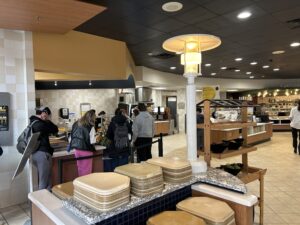75 lbs. of bacon and 450 eggs prepared every morning. 6,000 transactions a day. Although the Gustavus Adolphus Market Place is visited daily by about 1,500 Gusties, not many know about the hard work and dedication that goes into their delicious meals.
Every morning before the sun rises, the A.M. crew begins its work. Run by one executive chef and two sous chefs, the kitchen menu follows a four-week-cycle that was created over the previous summer and is continuously adjusted throughout the school year to accommodate students’ wants and needs. This grinding schedule isn’t all that makes the Market Place unique. “Unlike most other schools, like MSU or St. Olaf, Gustavus does not utilize a contracting company to run [their] kitchen,” said Executive Chef Adam Stewart. “Instead, [they] are self-operated and in total control, which provides flexibility in experimenting with and constantly updating menu items.”
Although some items are Market Place staples that are always available—think pasta and pizza—other areas, including the United Nations Station or the Mexican Line, are constantly introducing new cuisines. In fact, Margi Willmert, Assistant Director of Dining Services, said, “In the past, some students, especially international students, have come in and taught various recipes to the chefs. The MarketPlace is always open to learning new recipes and trying to come up with new things.”
The ordering, inventory, and stocking of ingredients is handled by Shari Jacobson ‘07, the Market Place Purchasing Manager. With orders being placed to distributors every day, some delivery drop-offs can arrive as early as 3:30 a.m.! Aside from the main distributors, Gustavus also utilizes locally sourced ingredients such as milk and apples, and when in season, fresh produce comes in from our student-managed Big Hill Farm.
For Gusties with dietary restrictions, Jen Donkin, the College’s registered dietitian, works with the chefs to analyze the recipes for nutritional content and the potential for food allergies; she also meets with students regarding any specific needs they may have, be they nutritional, religious, or cultural. The Market Place kitchen has a separate fryer and flat-top for gluten-free items, a fryer reserved for vegan items, and an allergy-friendly corner, so all students can be sure they will find something that works for their sustenance goals. “When I work with students with food allergies we often go up to the Cafeteria to show them where they can find foods that will work for their specific needs,” Donkin said. “We’ll also introduce them to the chefs and supervisors so they are more comfortable asking questions when they get their meals. We listen to students’ suggestions, and this spring we added a gluten-free waffle maker and sauces to the Wok area.”
The Market Place has not always been the à la carte style we see today. Before the infamous 1998 tornado, Gustavus students were all served the same meals and had little choice over what they ate. Post-tornado, Steve Kjellgren ‘86, Associate Vice President of Auxiliary Services, pushed for an à la carte style of dining because not all Gusties ate the same amount of food. By having choices, students could learn to budget accordingly. Foods accommodating dietary restrictions were eventually added so all Gusties—including those who were gluten free, dairy free, vegan, vegetarian, or have specific culturally based diets—could enjoy meals that cater to their tastes and needs.

How can students help ease the workload of the tireless Dining Services staff? First of all, get involved! “It’s no secret that we are one of the areas on campus that is and has been understaffed for quite some time,” Dining Service Supervisor Bobbi Sellner said. Although the Market Place can accommodate 300 student workers, only 160 are currently assigned, which is why it can’t stay open as late as it once did. “There are many days where the Deli is closed for lunch, and every night, we close the Rotisserie by 4:00 p.m. The student body has control over how long [we] operate,” Sellner said. “And it’s not just the Market Place; the Steamery and Courtyard Café could stay open longer too [if we had more workers].”
Students who already work in the Market Place can help the team effort by making sure not to miss shifts, which takes a heavy toll on the dining staff. Additionally, if you happen to drop or spill something in the Market Place, pick it up or tell one of the staff. “We’re not going to be mad, but at least tell us so we can help,” Sellner said. “There’s nothing worse than turning the corner and seeing a glass of spilled milk on the ground that no one told us about.”
Finally, Dining Services staff love to hear student opinions, both positive and negative. “Please come in, the door is always open!” Willmert said. “We are here for the students. They are the reason we work. It means a lot to hear from them.”
Despite the relentless pace and staffing shortages, the Dining Services folks agree that catering special events like Christmas in Christ Chapel and President’s banquets, along with interacting with students and learning about their lives, are among the job’s best perks. “I have created a bunch of close connections with many students that work with us, and also some that don’t work for us!” Sellner said. “It’s a day brightener when I am able to take a moment to chat with them.”